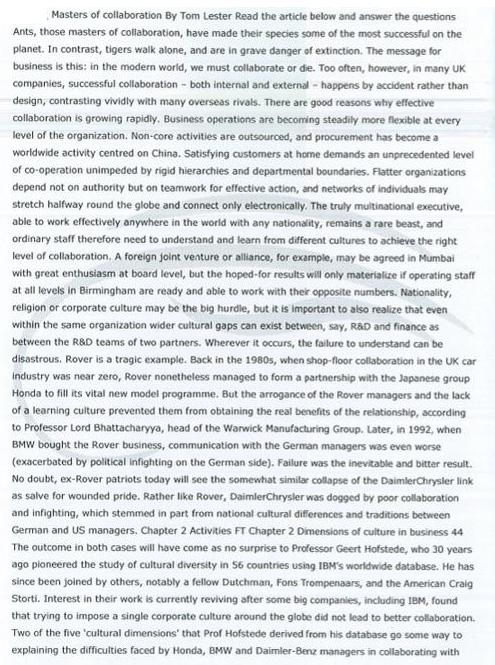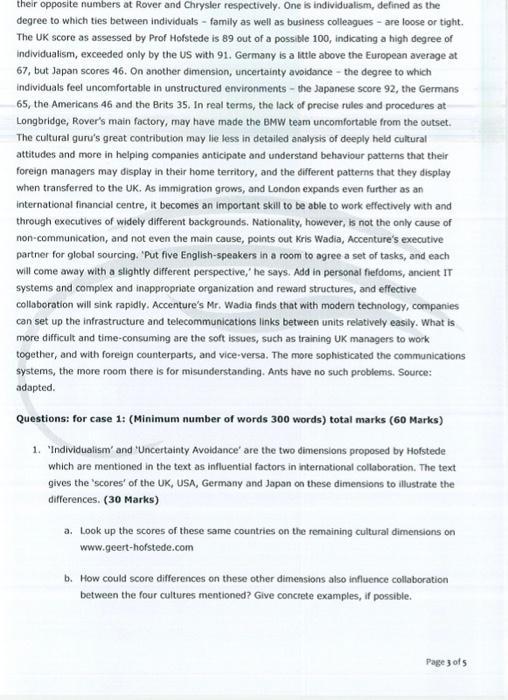Answered step by step
Verified Expert Solution
Question
1 Approved Answer
Masters of collaboration By Tom Lester Read the article below and answer the questions Ants, those masters of collaboration, have made their species some


Masters of collaboration By Tom Lester Read the article below and answer the questions Ants, those masters of collaboration, have made their species some of the most successful on the planet. In contrast, tigers walk alone, and are in grave danger of extinction. The message for business is this: in the modern world, we must collaborate or die. Too often, however, in many UK companies, successful collaboration - both internal and external - happens by accident rather than design, contrasting vividly with many overseas rivals. There are good reasons why effective collaboration is growing rapidly. Business operations are becoming steadily more flexible at every level of the organization. Non-core activities are outsourced, and procurement has become a worldwide activity centred on China. Satisfying customers at home demands an unprecedented level of co-operation unimpeded by rigid hierarchies and departmental boundaries. Flatter organizations depend not on authority but on teamwork for effective action, and networks of individuals may stretch halfway round the globe and connect only electronically. The truly multinational executive, able to work effectively anywhere in the world with any nationality, remains a rare beast, and ordinary staff therefore need to understand and learn from different cultures to achieve the right level of collaboration. A foreign joint venture or alliance, for example, may be agreed in Mumbai with great enthusiasm at board level, but the hoped-for results will only materialize if operating staff at all levels in Birmingham are ready and able to work with their opposite numbers. Nationality, religion or corporate culture may be the big hurdle, but it is important to also realize that even within the same organization wider cultural gaps can exist between, say, R&D and finance as between the R&D teams of two partners. Wherever it occurs, the failure to understand can be disastrous. Rover is a tragic example. Back in the 1980s, when shop-floor collaboration in the UK car industry was near zero, Rover nonetheless managed to form a partnership with the Japanese group Honda to fill its vital new model programme. But the arrogance of the Rover managers and the lack of a learning culture prevented them from obtaining the real benefits of the relationship, according to Professor Lord Bhattacharyya, head of the Warwick Manufacturing Group. Later, in 1992, when BMW bought the Rover business, communication with the German managers was even worse (exacerbated by political infighting on the German side). Failure was the inevitable and bitter result. No doubt, ex-Rover patriots today will see the somewhat similar collapse of the DaimlerChrysler link as salve for wounded pride. Rather like Rover, DaimlerChrysler was dogged by poor collaboration and infighting, which stemmed in part from national cultural differences and traditions between German and US managers. Chapter 2 Activities FT Chapter 2 Dimensions of culture in business 44 The outcome in both cases will have come as no surprise to Professor Geert Hofstede, who 30 years ago ploneered the study of cultural diversity in 56 countries using IBM's worldwide database. He has since been joined by others, notably a fellow Dutchman, Fons Trompenaars, and the American Craig Storti. Interest in their work is currently reviving after some big companies, including IBM, found that trying to impose a single corporate culture around the globe did not lead to better collaboration. Two of the five 'cultural dimensions' that Prof Hofstede derived from his database go some way to explaining the difficulties faced by Honda, BMW and Daimler-Benz managers in collaborating with their opposite numbers at Rover and Chrysler respectively. One is individualism, defined as the degree to which ties between individuals family as well as business colleagues - are loose or tight. The UK score as assessed by Prof Hofstede is 89 out of a possible 100, indicating a high degree of individualism, exceeded only by the US with 91. Germany is a little above the European average at 67, but Japan scores 46. On another dimension, uncertainty avoidance - the degree to which individuals feel uncomfortable in unstructured environments - the Japanese score 92, the Germans 65, the Americans 46 and the Brits 35. In real terms, the lack of precise rules and procedures at Longbridge, Rover's main factory, may have made the BMW team uncomfortable from the outset. The cultural guru's great contribution may lie less in detailed analysis of deeply held cultural attitudes and more in helping companies anticipate and understand behaviour patterns that their foreign managers may display in their home territory, and the different patterns that they display when transferred to the UK. As immigration grows, and London expands even further as an international financial centre, it becomes an important skill to be able to work effectively with and through executives of widely different backgrounds. Nationality, however, is not the only cause of non-communication, and not even the main cause, points out Kris Wadia, Accenture's executive partner for global sourcing. 'Put five English-speakers in a room to agree a set of tasks, and each will come away with a slightly different perspective,' he says. Add in personal fiefdoms, ancient IT systems and complex and inappropriate organization and reward structures, and effective collaboration will sink rapidly. Accenture's Mr. Wadia finds that with modern technology, companies can set up the infrastructure and telecommunications links between units relatively easily. What is more difficult and time-consuming are the soft issues, such as training UK managers to work together, and with foreign counterparts, and vice-versa. The more sophisticated the communications systems, the more room there is for misunderstanding. Ants have no such problems. Source: adapted. Questions: for case 1: (Minimum number of words 300 words) total marks (60 Marks) 1. Individualism' and 'Uncertainty Avoidance' are the two dimensions proposed by Hofstede which are mentioned in the text as influential factors in international collaboration. The text gives the 'scores' of the UK, USA, Germany and Japan on these dimensions to illustrate the differences. (30 Marks) a. Look up the scores of these same countries on the remaining cultural dimensions on www.geert-hofstede.com b. How could score differences on these other dimensions also influence collaboration between the four cultures mentioned? Give concrete examples, if possible. Page 3 of 5
Step by Step Solution
★★★★★
3.48 Rating (151 Votes )
There are 3 Steps involved in it
Step: 1
a Here are the scores for the UK USA Germany and Japan on the remaining cultural dimensions according to Hofstedes model MasculinityFemininity UK 66 U...
Get Instant Access to Expert-Tailored Solutions
See step-by-step solutions with expert insights and AI powered tools for academic success
Step: 2

Step: 3

Ace Your Homework with AI
Get the answers you need in no time with our AI-driven, step-by-step assistance
Get Started


